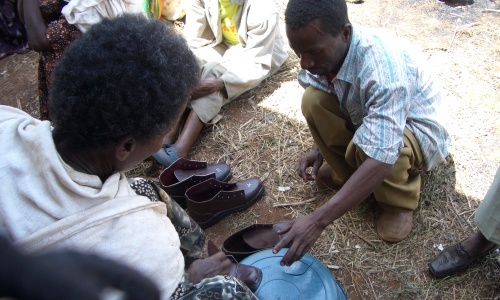In Ethiopia, about one million people suffer from these painful lymphoedemas, in which their feet and legs are swollen up to the hips. Toxic silicates in the Ethiopian volcanic soil, which penetrate the skin when walking barefoot and block the fine lymph vessels, cause the feet and legs to swell. That is why it is important to wear shoes. This is also the central message of the podoconiosis poster campaign in Ethiopia: "Shoes protect against injuries and infections, they prevent swelling of the feet and legs". In Ethiopia, high-quality leather is produced and shoes are also made, but mainly for export. For the rural population, there are only shoes made of plastic, if any, and many people are so poor that they cannot afford shoes at all.
In western Ethiopia, DIFÄM supports a clinic of the Mekane Yesus Church, which includes a podoconiosis centre. Here, health workers are trained. They learn how and with which products the swollen feet have to be bathed and cleaned so that the inflammation will subside and the swelling go down. In self-help groups, patients learn about the cause of their disease. They learn that it is not inherited, is not contagious and that elephant feet are not the result of a witch's spell. They also practise washing their feet thoroughly - with homemade soap and oil. Socks from China and leather shoes from Ethiopia are sold at half price. Those who follow the instructions will soon notice that the painful inflammation of their lymphatic system recedes. The foul smell of the feet caused by inflammation disappears and people can go back to work and participate in social life.
The treatment of a podoconiosis patient in Ethiopia costs 15 euros. The money raised by DIFÄM can be used to buy, among other things, the necessary materials for making ointments, as well as leather shoes produced in Ethiopia.

